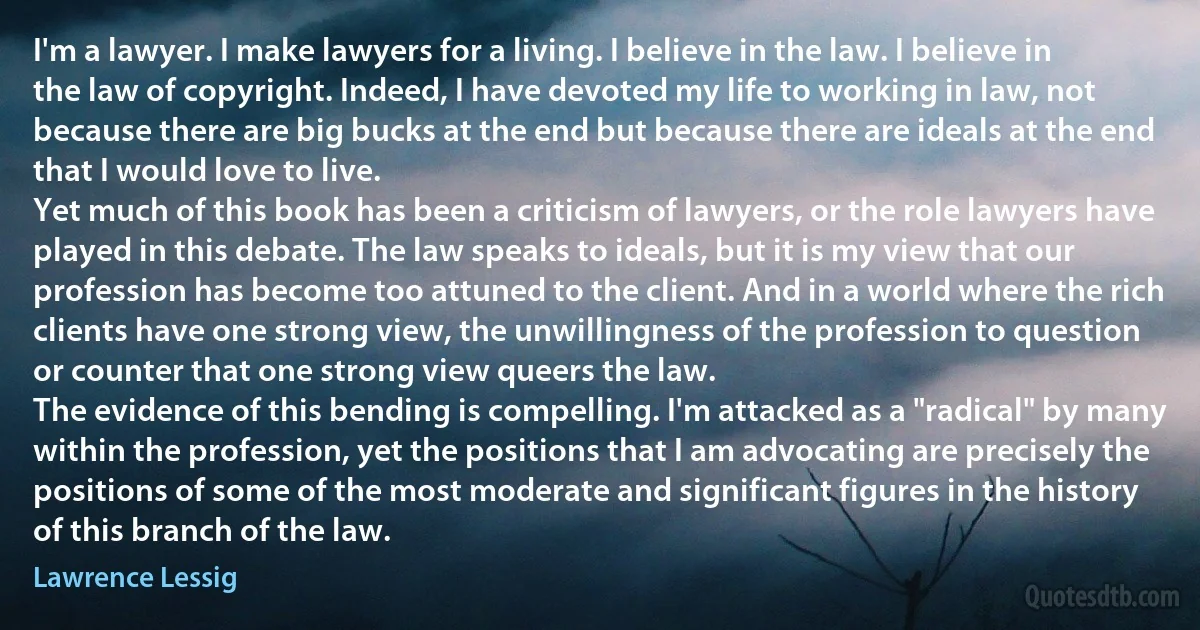
I'm a lawyer. I make lawyers for a living. I believe in the law. I believe in the law of copyright. Indeed, I have devoted my life to working in law, not because there are big bucks at the end but because there are ideals at the end that I would love to live. Yet much of this book has been a criticism of lawyers, or the role lawyers have played in this debate. The law speaks to ideals, but it is my view that our profession has become too attuned to the client. And in a world where the rich clients have one strong view, the unwillingness of the profession to question or counter that one strong view queers the law. The evidence of this bending is compelling. I'm attacked as a "radical" by many within the profession, yet the positions that I am advocating are precisely the positions of some of the most moderate and significant figures in the history of this branch of the law.
Lawrence LessigRelated topics
believe book branch compelling copyright criticism debate end history law lawyer life living live love question rich significant view working world yetRelated quotes
A system designed to protect individual liberty will have no punishments for any group and no privileges. Today, I think inner-city folks and minorities are punished unfairly in the war on drugs.
For instance, blacks make up 14% of those who use drugs, yet 36 percent of those arrested are Blacks and it ends up that 63% of those who finally end up in prison are Blacks. This has to change.
We don't have to have more courts and more prisons. We need to repeal the whole war on drugs. It isn't working. We have already spent over $400 billion since the early 1970s, and it is wasted money. Prohibition didn't work. Prohibition on drugs doesn't work. So we need to come to our senses. And, absolutely, it's a disease. We don't treat alcoholics like this. This is a disease, and we should orient ourselves to this. That is one way you could have equal justice under the law.

Ron Paul
He loved his profession, he had a real sense of dedication to the administration of justice, he held his head high as a lawyer, he rendered and exacted courtesy, honor and straightforwardness at the Bar. He respected the judicial office deeply, demanded the highest standards of competence and disinterestedness and dignity, despised all political use of or trifling with judicial power, and had an affectionate regard for every man who filled the exacting prescription of the just judge. The law to him was like a religion, and its practice was more than a means of support; it was a mission. He was not always popular in his community, but he was respected. Unpopular minorities and individuals often found in him their only mediator and advocate. He was too independent to court the populace - he thought of himself as a leader and lawgiver, not a mouthpiece.

Robert H. Jackson
In the Cabinet there were large Irish proprietors, and, without imputing to any proprietor a desire of doing injustice to his tenants, it was easy to understand that after the long continuance of the present state of the law in Ireland, proprietors were alarmed at any proposition coming to them like the Bill of the hon. Member for Rochdale. The Irish proprietors in the Cabinet, in that House, and out of it, were afraid of a Bill that would interfere with the powers and privileges that a Parliament of landowners for generations past had been conferring upon the proprietors of the soil. That was the point. The question was, could the cats wisely and judiciously legislate for the mice? He did not believe it. He was as much opposed as any man could be to transferring the land from the landlord to the tenant; but a measure of justice was due from the former to the latter, both in Ireland and in this country as well.

John Bright
At the establishment of our constitutions, the judiciary bodies were supposed to be the most helpless and harmless members of the government. Experience, however, soon showed in what way they were to become the most dangerous; that the insufficiency of the means provided for their removal gave them a freehold and irresponsibility in office; that their decisions, seeming to concern individual suitors only, pass silent and unheeded by the public at large; that these decisions, nevertheless, become law by precedent, sapping, by little and little, the foundations of the constitution, and working its change by construction, before any one has perceived that that invisible and helpless worm has been busily employed in consuming its substance. In truth, man is not made to be trusted for life, if secured against all liability to account.

Thomas Jefferson
I hope none who hear me will confound this expression of mine with advocacy of the right of a state to remain in the Union, and to disregard its constitutional obligations by the nullification of the law. Such is not my theory. Nullification and secession, so often confounded, are indeed antagonistic principles. Nullification is a remedy which it is sought to apply within the Union, and against the agent of states. It is only to be justified when the agent has violated his constitutional obligation, and a state, assuming to judge for itself, denies the right of the agent thus to act, and appeals to the other states of the Union for a decision; but when the states themselves, and when the people of the states, have so acted as to convince us that they will not regard our constitutional rights, then, and then for the first time, arises the doctrine of secession in its practical application.

Jefferson Davis
